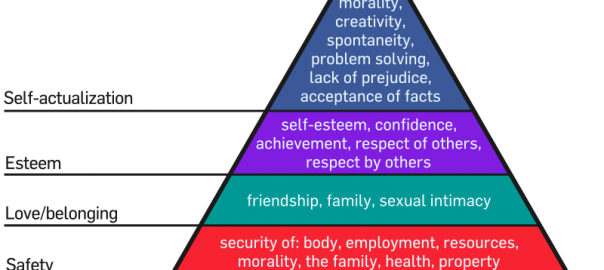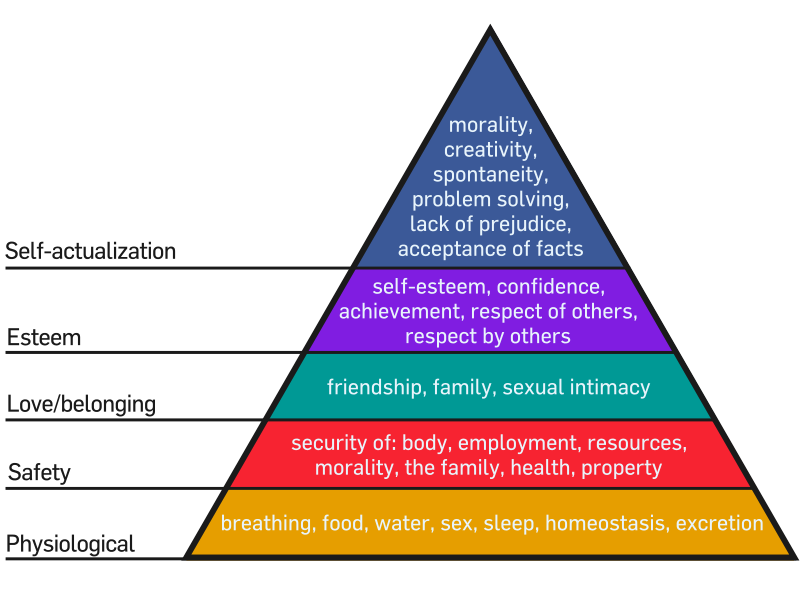Maslow and the minimalist movement

I’ve been reading Paul Stamatiou’s blog since he was an undergraduate. After a couple of startups he’s now working for Twitter. Yesterday, he posted this about his new-found minimalism:
I sold or tossed a ton of stuff I didn’t need, use or wear. I stopped wearing all those free startup shirts I gathered over the years and moved on to button-ups. I use Laundry Locker to deal with ironing them so I don’t spend my Sundays doing this. I buy toothpaste, shampoo and the like in bulk on Amazon so I don’t have to remember to make monthly errands. I moved to a slimmer wallet and carry less stuff with me everywhere. I cancelled unnecessary monthly billed services so there’s less to think about when I see my statements.
This is great. This is something I’ve tried to do. This is something to which I aspire. But the trouble is that it requires money to do this. And I’m guessing Stammy’s new found outlook on life is helped by the fact he’s probably not earning peanuts at Twitter.
Here’s Maslow’s hierarchy of needs. It’s not perfect, but let’s use it as a convenient hypocrisy:

People don’t need money to be happy, certainly not. But there’s a level of financial security that allows you to say “screw you” to the world. It’s easy to forget just how soul-crushing money worries can be. Indeed, it’s one of the biggest causes of strife in relationships.
The trouble with minimalism, as others have pointed out, isn’t the message but the messenger. It’s rich, successful (mainly white) males saying “I don’t need all of this stuff to be happy!”. That’s great, but we should be mindful that people not so well-off sometimes need stuff as a just-in-case. They haven’t got the financial resources to just go and buy whatever they need there and then.
I completely accept Leo Babauta’s point about minimalism being a constant critique/mindset rather than a lifestyle. It’s just that two seem to be rather conflated at this point in time. For rich people a spartan aesthetic means iPhones and white furniture. For less well-off people minimalism looks very much like poverty.
Image from Wikimedia Commons

I really don’t get the point about the equation being rich = being minimalist. I am not rich and I am minimalist, very simple fact.
Perhaps the argument was too subtle. I’m saying that getting to a certain level of financial security allows you to focus on other things, like reflecting on your life. That doesn’t necessarily mean being ‘rich’, per se, but it does mean not having to think and talk about money.
Reflecting on your life leads to you being more intentional about it, hence the ability to become more minimalist. So, you don’t have to be rich to be minimalist, but it helps.*
*It also depends on your group of peers. If they equate prosperity with material things, then that’s what you’re likely to accumulate. People respond to (emotional) incentives. 😉
I’m also not rich and a sub-minimalist. Meaning I have gotten rid of a lot of stuff and only have a few possessions. I’m also married and have 2 kids. You don’t have to be rich to clear out the clutter. I order bulk on amazon too, that’s not about being rich. That’s about being smart with how you shop.
Indeed, and again I’m talking about the idea being great but the spokespeople being problematic. 🙂
Depends how you define rich. If you can afford to bulk-buy in advance you are well off compared with most of the world. Many many people survive by eking out what they can week on week, or even day on day, and every day is scary because of the unexpected bill that might come. It does grate when people act like they’ve discovered some kind of moral plane of minimalism, above the cluttered masses, when the truth is it’s because they can afford it. In so many ways it is more expensive to be poor. “I use Laundry Locker to do ironing …” – hello!?! Yes using the modern equivalent of household servants does make life easier, doesn’t it? (This is a dig at the guy quoted in the original post, not the commenter here).
I liked this! I think there are differences between living a minimalist lifestyle and realising that the things that you say ‘no’ to actually define you in a powerful way. The second of course is more intentional minimalism whereas the first appears to be a way of appropriating a ready-made existence and even a form of subjugation. Living sustainably is also quite different from just using less, because it is actually about using less to do more – and hopefully not just being awkward for the sake of it 🙂
What a great way to put it, Thomas – thank you! 😀
It is interesting that Maslow uses a pyramid to represent his hierarchy of needs. Since pyramids are wider at the base is Maslow saying that safety is more important or we need more of it. Is the same true as we move up the pyramid, is each level less important or we need less of it. Maybe it is that each level is more difficult to attain. I will have to re-read my pysch 101.
As to money, I don’t think it has much to do with where you are in the hierarchy. You can find people who have plenty of money that are living at the bottom two levels and people with little money who live at the top two levels.